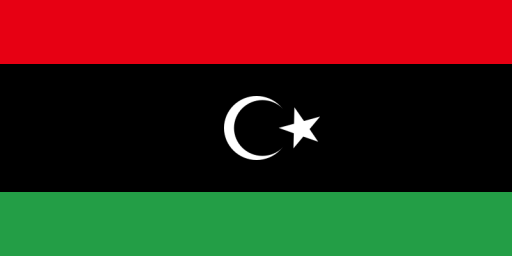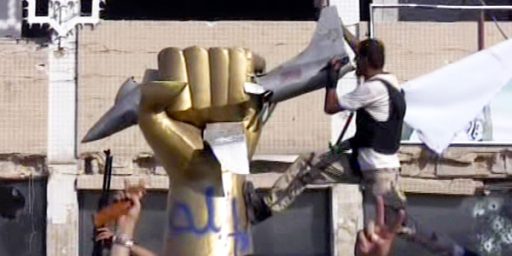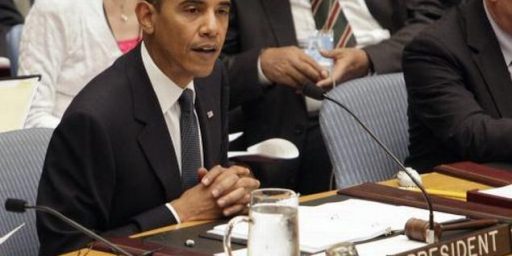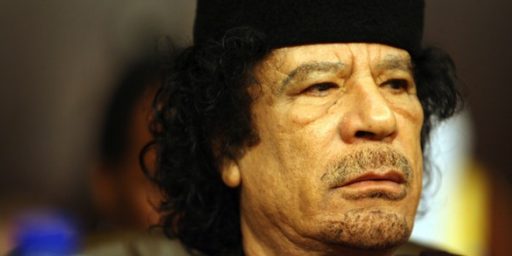NYT: Put Boots on the Ground in Libya
The NYT says it's time for U. S. advisers and military air traffic controllers on the ground in Libya.

The New York Times editorializes in favor of an increased military presence on the part of NATO and, specifically, the United States in Libya:
Advocates of a short-term bombing campaign were wrong. Civilians are not being protected as envisioned, Colonel Qaddafi isn’t folding, and as tribes threaten to enter the fray, Libya may be nearing collapse. Washington now has three options — none of them ideal.
America could pull out, making a tacit admission that the intervention was a strategic mistake. But a resurgent Colonel Qaddafi would likely seek revenge against the rebels and those who helped them. Moreover, NATO’s resolve would be called into question, as would America’s. Whatever influence Washington might have in the region would evaporate and Al Qaeda would waste no time pointing out that the United States had abandoned Muslims on the battlefield.
Or we could continue doing the minimum necessary to avoid losing. But even if Colonel Qaddafi were to eventually fall, we’d still face the significant and unknown consequences of a postwar Libya. The United States and NATO would not be able to simply leave. We tried this in Afghanistan and Iraq, and it got us an insurgency.
Finally, the United States and its allies could commit the military resources required to genuinely protect Libyan civilians and oust Colonel Qaddafi. Unlike the Bosnian Croats in 1995 and the Northern Alliance in Afghanistan in 2001, the rebel forces in Libya are too disorganized to take advantage of NATO air support. To give them a fighting chance, NATO must put military advisers and combat air controllers on the ground — not just British, French and Italian, but also a small number of American ones.
Frankly, I find this editorial puzzling. If, indeed, the NYT editors are right and the rebels are too disorganized to exploit NATO air support, how are they organized enough to secure Libya after Qaddafi has been overthrown? Will the required degree of organization be taught by NATO advisers? Will it be provided by NATO advisers? How is that not neocolonialism? If the history of the last half of the 20th century is any gauge, Libyans will find that plan more offensive than they do Qaddafi.
In my view the countries of the Middle East and North Africa face a similar problem. Democracy worthy of the name is not founded solely on aspirations but on institutions. Organizing an election is not itself establishing a democracy. It is a step in establishing a democracy.
After generations (or centuries) of authoritarian rule that has actively dismantled virtually every institution that competes with it leaving the only viable institutions itself, the military, and, possibly, some religious institutions, establishing the institutions to support a democracy is a long and arduous task requiring a patience that is in terribly short supply. This isn’t just a problem for MENA. It’s a problem for any country with a paucity of institutions to support democracy, viz. Russia.
As of this writing the military appears to continue to support Qaddafi in Libya and al-Assad in Syria. In Egypt it may be the case that they’ve overthrown the dictator without overthrowing the dictatorship. Time will tell. But even under the best of circumstances establishing viable democratic government will be difficult in these countries and in Libya the conditions are not optimal.






It was boneheaded to go in. Isn’t that why someone said “turd sandwich?”
The editorial has an absolutely bizarre reading of Iraq and Afghanistan.
I’m officially uncommited on Libya, but from Obama’s stand point, option #2 makes the most sense, and the arguments against it make no sense.
I think our plan for Libya if/when Gaddafi leaves is to declare victory, find people in the Libyan military we can make deals with and work with them to set up a carefully-managed democracy.
Indeed, a lot of foreign policy problems stem from a failure to realize that it should be the LAST step.
Excuse me, but the NYT most definitely did not call for boots on the ground. This is an opinion piece written by some retired officer, as it says quite clearly on the piece itself. Like all non-right wing papers, the Times runs op-eds by people espousing all sorts of opinions. Printing such a column is giving a voice to various viewpoints, not endorsing what they say.
I suppose it’s easier to make this kind of mistake if you read online. In the paper itself it’s obvious that the Times opinions run down the left side of the left page next to the letters, while the outside voices are on the right page. But that doesn’t excuse the fact that this headline and much of the post are completely wrong. I suggest a correction…
I think what we have is armchair strategists with short attention spans. A reminder that the rebels use February 17 as the start date of their uprising. That’s not even 2.5 months ago. But the NYT is impatient for this to be wrapped up.
Why?
A few military facts to consider:
1) The rebels appear to have 100% control in the east.
2) Gaddafi has less than 100% in the west. He has not taken Misrata. And as long as Misrata fights, he probably won’t. It’s Stalingrad with an operational port.
3) In every important category: money, men, weapons, ammunition, Gaddafi has less with each passing day.
4) Because of (3) above, a stalemate favors the rebels.
5) If Gaddafi can’t take Misrata he sure can’t take Benghazi.
The key question is the political cohesion of the rebels. If they stay motivated and united they will almost certainly prevail eventually, or at worst take a stalemate that will leave them in control of the east and parts of the west.
I think michael reynolds needs to watch Team America every night for a week.
If you read Chivers, it is pretty clear that the rebels are also running out of weapons and ammo. They are using guns I havent heard of in years. OTOH, they have been pretty ingenious with their improvisations. I think at best, they can continue to stalemate for a while, but they seem to fall apart when on the offensive.
Steve
syeve:
Both sides fall apart on the offensive because in street fighting the advantage is with the defense.